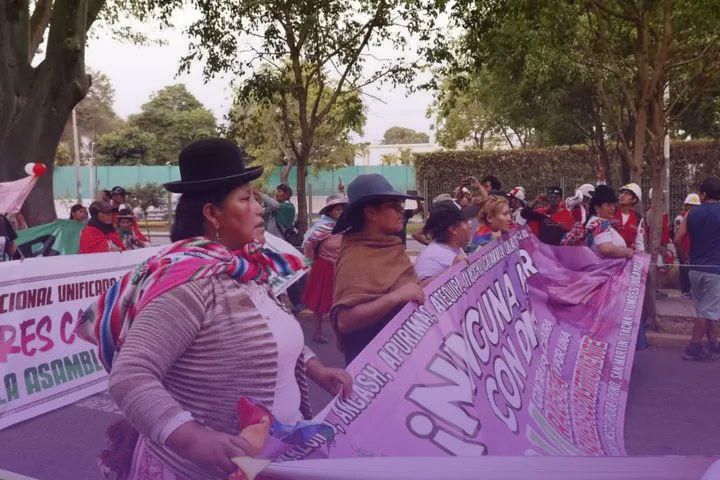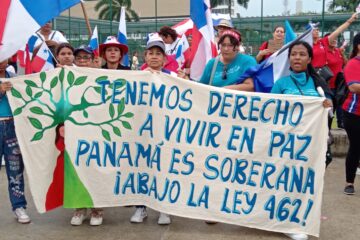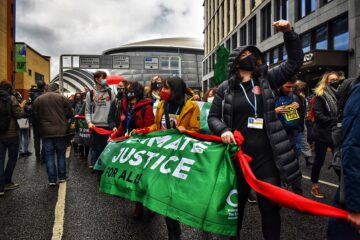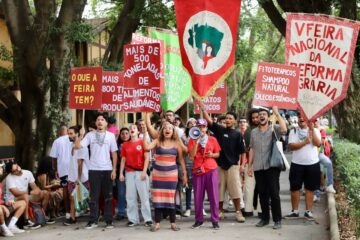Grassroots movements in Peru have been struggling for more than three months. On December 7th, 2022, Pedro Castillo was removed from the presidential office of Peru and arrested, in a coup staged by right-wing sectors that form a majority in the National Congress. Peaceful mass demonstrations began immediately after that, as Peru’s grassroots movements started to demand the resignation of Dina Boluarte (the vice president who took Castillo’s office) and members of parliament, as well as to call for a constituent assembly.
In response, they are being met with gunshots, arrests, disappearances, and physical and psychological violence perpetrated by the state. Between December 2022 and March 2023, more than 400 people have been criminalized, more than 60 have been killed during demonstrations, and thousands have been injured.
The grassroots mobilization has been combining local, regional, and nationwide demonstrations, staging strikes and major rallies simultaneously across the country. A significant moment amid this mobilization was the Takeover of Lima, on January 19th, 2023, when grassroots movements, workers’ movements, feminist movements, peasant and Indigenous movements from the country came together in the capital.
With watchwords, songs, dances, posters, banners, and more, we walked day after day around Lima’s huge streets, mobilizing and raising awareness, and being received with intense repression by the police and the military, who shot directly against our bodies and attacked demonstrators, showing all the racism of the institutions that support and run them.
World March of Women Peru, North Macroregion
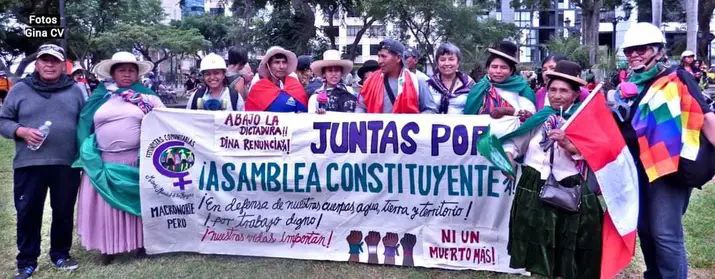
Feminism has been working towards building unity in the national struggle, raising banners from their territories across different parts of the country, as argued by Ruth Reyes, the coordinator of the Circle of Feminist Actions (Círculo de Acciones Feministas—CAFEM). Both women with mixed-gender movements and those who self-organize establish delegations to travel to the capital, continuously keeping the mobilization active and organized through networks.
The peasant woman is no longer afraid. Every sister, in every region, has been organizing and joining delegations and more delegations to get to the capital city and take part in the peaceful demonstrations we are staging.
Lourdes Huanca
A Coup Against the Peoples and Nature
The account by Rosa Sara Huaman Rinza, a leader of the Indigenous community San Juan de Kañaris, exposes the grassroots denunciation of racism and colonialism that underpin transnational extractivism in the country. “We are here in Lima because we are tired of being discriminated against, of being called ‘Indians,’ ignorant, cholos, serranos1. Despite the fact that we sustain life and feed the cities, they treat us terribly,” she argues.
The militants denounce that the coup is not only seizing democracy—it is also seizing common goods, nature, and peasant and ancestral territories. “This state is constantly discriminating against us and handing over our territories to transnationals. These are our forests, our lakes and aquifers that produce fresh water to feed cities, but they don’t care, because their profits come first,” Rosa Huaman says.
Lourdes Huanca, of La Via Campesina, says that 2023 is a crucial year, because it is when oil and mining concessions will be reviewed. “We need strength to pressure this, because this is the reason why they are keeping Pedro Castillo in prison.”
We are here carrying on our shoulders the people who have been murdered by this patriarchal, capitalist system that always puts capital over our lives. We are here because ‘Killer Dina’ and this coup-staging Congress are trying to put an end to our territories, accepting contracts and legislation that hurt our lands, communities, and waters.
Liz Medrano, coordinator of the TLGBIQ+ Community of Lambayeque
For a Solid, Grassroots Democracy
The demand for a constituent process is part of the current Latin American wave that calls for a profound reorganization of the state. This is a demand to free ourselves from neoliberalism, inequality, and the primacy of the profit-driven logic incorporated into Constitutions drafted during times of intense authoritarianism. Peru right now is exactly in this position: its current Political Constitution was formulated during the dictatorial government of Alberto Fujimori, in 1993.
Overthrowing the current Constitution means curbing “extractivist neoliberalism, which in 30 years has brought us huge inequality, exploitation, disrespect to rights, institutionalization of slave labor in agribusiness, reconcentration of land ownership in private hands, dispossession, water pollution, destruction of territories, militarization, and criminalization of protests,” the World March of Women in the country states.
Our Peruvian sisters are demanding a democracy that comes from the peoples, from women, from communities, from their needs regarding a dignified life and in defense of nature and good living. To do so, “depatriarchalization, decolonization, and anti-capitalism are a process that must be empowered from the bases, from the collective, and from the community.”
For March 8, a joint effort of feminist organizations including the World March of Women Peru published a statement titled “This Democracy Is No Longer a Democracy” (“Esta democracia ya no es democracia”). The document denounces how conservative sectors have been moving to pass policies against the peoples amid this context of lack of democracy.
Forces against rights are pushing counter-reforms in education, sexual and reproductive rights, and they aim to co-op institutions such as the Constitutional Court and the current Public Defender’s Office. Right-wing and left-wing conservatism has been on the rise and threatening women’s and LGBTQI+ people’s rights, thus posing a threat to a truly democratic bid.
“This Democracy Is No Longer a Democracy” statement
No More Repression
The Dina Boluarte government plans to increase sentences for those who stage social protests, in a strategy to criminalize political and solidarity-driven organizing. “The ordinary justice system is acting like in the old days of Fujimontesinism,2 killing, militarizing, and criminalizing protests,” says Lourdes Contreras, the vice president of the 13th Zone of Peasant Patrols of the Cutervo province and WMW coordinator in the North Macroregion of Peru.
As women argue in their March 8 statement, “the arrests are made under degrading and cruel conditions, with a gender bias towards the women who are arrested, including illegal and arbitrary interventions as well in the facilities of social, educational, and political organizations.” The organizations especially denounce the racist persecution against Aymara women.
The arrests are driven by sexism and racism and are being especially used to punish the women who leave their homes to join the demonstrations. But as Lourdes Contreras says, “Indigenous, peasant, young, rural women and women from the outskirts have been resisting for more than 500 years.”
Peoples’ Solidarity
International, peoples’, and movements’ solidarity is key to defeat the coup plotters and strengthen the return of democracy.
In addition to street struggles in the country, the work of international denunciation carried out by Peruvians who live or travel abroad has been playing an important role. The peasant militant Lourdes Huanca reported her efforts to expose the situation to members of parliament and activists from different European countries, which led to international reports and statements in favor of the demonstrators, as well as in sanctions against militarization.
“In our country, they are killing with bullets. In Spain, they were able to stop the gun trade with Peru. Also in Spain, the [Peruvian] ambassador started a campaign against me, claiming I am defaming our homeland. However, I believe that our sisters’ solidarity is what led him to be removed from office,” Lourdes Huanca argues. In the Americas, the critical stance taken by progressive governments has also been important to undermine the acknowledgment of Dina Boluarte.
One example of practice of solidarity beyond borders in Latin America is the International Mission for Solidarity and Human Rights. The mission visited Peru between February 8th and 13th, 2023, with working groups visiting different cities affected by the conflict, including Juliaca, Ica, Cusco, Ayacucho, and Lima. The group was able to observe severe human rights violations and took on the responsibility to support the international denunciation of state repression.
Maria Jose Cano, one of the participants of the mission, is the national director of Human Rights of the Center of Workers from Argentina—Autonomous (Central de Trabajadores de la Argentina Autónoma—CTAA). She says the mission fulfilled its role of witnessing the suffering and resistance of the Peruvian people, listening to the victims, their families, and leaders of grassroots organizations.
Based on accounts and the huge volume of evidence we gathered, the mission reached the preliminary conclusion that the Peruvian state must be investigated, as, through its official security and armed forces, it allegedly killed, tortured, abused, persecuted, threatened, and intimidated huge vulnerable sectors of the Peruvian people. Based on several accounts, we were able to verify that the repression disproportionately and brutally imposed targeted the civil population, the many grassroots demonstrations and their surroundings; and we also confirmed the abusive use of lethal weapons with several consequences for the physical integrity of Peruvian men and women. The Peruvian people has the right to have this taken to all levels of jurisdiction, national and international, to get the truth and justice.
Maria Jose Cano
- Both the term “cholo,” meaning people of mixed-blood heritage, and the word “serrano,” which in other countries can simply mean “coming from the countryside,” are considered derogatory and racist in Peru and are used to refer to poor people with Indigenous facial features. [↩]
- The word “Fujimontesinism” (“Fujimontesinismo”) refers to the former Peruvian dictator Alberto Fujimori and his advisor Vladimiro Montesinos, who during the Fujimori dictatorship was in charge of the country’s National Intelligence Service and led the crimes against humanity and the acts of corruption perpetrated in the period. [↩]

